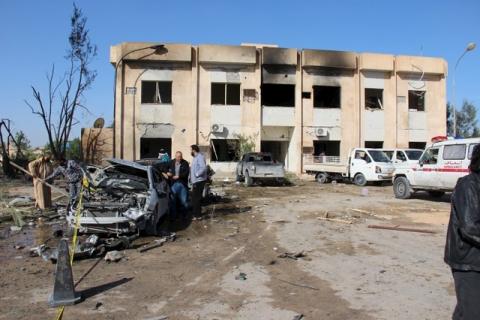Advertisement
Islamic State claims Libyan police centre bombing
TRIPOLI (Reuters) - Islamic State has claimed responsibility for a suicide truck bombing on a Libyan police training centre on Thursday that killed at least 47 people, in the worst such attack since the fall of Muammar Gaddafi in 2011.
Islamic State fighters have expanded their presence in the North African state, taking advantage of turmoil to control the city of Sirte and launch attacks on oilfields and key oil ports.
"This operation is one in a series of the battle of Abu al-Mughira al-Qahtani, which will not stop until we liberate all Libya," Islamic State's Tripoli militancy said in a statement.
The group said one of its militants had died carrying out the suicide bomb attack. Libyan authorities have not confirmed that.
The truck bomb exploded at the police training centre in the coastal town of Zliten just as hundreds of recruits had gathered for a morning meeting. More than 100 people were also wounded, many by shrapnel.
Since a NATO-backed revolt ousted Gaddafi, Libya has slipped deeper into turmoil, with two rival governments and a range of armed factions locked in a struggle for control of the OPEC state and its oil wealth.
In the chaos, Islamic State militants have grown in strength, targeting Tripoli and also oil infrastructure, including this week's shelling of two major oil export terminals in the east.
Western powers are pushing Libya's factions to back a U.N.-brokered plan for a national unity government to join forces against Islamic State militants, but the agreement faces major resistance from several factions on the ground.
Libya's prime minister-designate under the U.N.-backed plan, Fayez Seraj, said in Tunis on Friday that the council nominated to name a new government was committed to doing so by the agreed deadline of Jan. 17.
Speaking after a meeting with European Union foreign policy chief Federica Mogherini, he said the two had discussed counter-terrorism policy, and in particular assistance with border controls.
Mogherini said Thursday’s attacks and those at the oil terminals "remind us that the security situation in Libya needs to be tackled immediately and with unity".
She said the international community was ready to offer support, but Libya should decide the terms.
"The best way to respond to the attacks by Daesh (Islamic State) on Libyan territory is unity among Libyans and their own fight against terrorism," she said.
(Reporting by Ali Abdelatti in Cairo, Aziz El Yaakoubi in Rabat and Aidan Lewis in Tunis; writing by Patrick Markey; editing by Andrew Roche)



















Add new comment